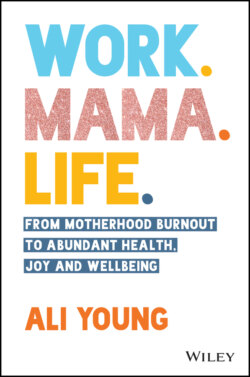Читать книгу Work. Mama. Life. - Ali Young - Страница 11
Observations from before I took the leap into motherhood
ОглавлениеWhen I graduated from RMIT University way back in 2002, I thought motherhood was just another linear element in our life, a trajectory that a lot of women traverse along because it is the ‘done’ thing. As a country kid growing up in regional Victoria, I was encouraged to study one of three professions: doctor, lawyer or stockbroker. These were perceived as my way out of the country life and into a ‘safe job’.
My mum worked at the hospital in town as a sonographer and I would often go there after school to wait for a lift home (town was some 45 kilometres away from our home). Interestingly, I began to observe the difficulties professional women experienced in that environment, and how they were always juggling and figuring out how to ‘manage it all’.
When I was 15, I went to a chiropractor for the first time and, as well as getting rid of the pain I'd been experiencing in my feet for a long time, I learned that they could choose their own working hours. Subconsciously, choosing chiropractic — a career that is supportive of working mums — was a no-brainer. Not only had it been modelled to me as an easy working-mum choice but having been around inter-generational models of working mothers, I guess I felt well placed to ‘have it all’.
As a 23-year-old chiropractor, I gave it little regard, however, and began on my lightning-fast career trajectory. This took me to the other side of Australia, all the way to Perth, where I met some amazing women who have influenced my motherhood. Love stories abound about how we all met … but I'll save that for another time!
At university, when I was studying chiropractic, there was zero focus on matrescence (the beautiful shift and change from woman to mother, something I'll be discussing in depth in chapter 3) and the stages of motherhood. We were taught about the pregnant mother, but not how to care for the post-partum one. We were taught about newborn babies, infants and toddlers. We were taught about the hormonal flux of adolescence. There was no highlight reel of the elements of motherhood we needed to be supportive of. It was pretty much glossed over. This really needs to change if we are going to support mothers in the way they need us to.
When I began practising, I was blessed to take over a private family practice and I began working closely with mums, both for themselves and as parents of the children under my care. It was here that I witnessed, firsthand, the desire of mothers to have all of the best things for their children, including health.
Mums would constantly chase the to-do list that helped them to keep their child/ren healthy, with a complete disregard for their own health. There was so much focus on doing everything for their family that stopping to care for themselves was never a priority that made it onto the completed to-do list.
This pattern would keep occurring until they fell in a heap, which is where I would step in as part of the team putting them back together.
Sound familiar? I'm sure it does for some of you. And probably not for others.
Interestingly, this was modelled to me in practice as the norm for all mums. It took until I became a mother, and explored how I could maintain my own personal vitality, to dig into these concepts of health for mums. The dichotomy of not being selfish, but choosing to care for myself as well as my child — which may be different from the expected norm in standard Western society — was a hard pill to swallow. The true expression of both mum-guilt and the ‘perfect mother’ myth had ingrained themselves in my thoughts around what a mother was, and it began to impact my motherhood.
I'd seen my business partner and best friend traverse a multiple pregnancy, and how the system had expectations of her to birth a certain way because she was having triplets. She sought out health professionals who supported her choice to have a vaginal birth, which somewhat made her an outlier. This then formed an element of minority fatigue throughout her mothering journey. Add to this the expectation that, because she became a mum to three amazing little humans, she was supposed to constantly be equally fully fatigued and extremely grateful.
She, however, chose something different for herself and her family. For her, work was a large part of her values system and it allowed her to feel herself amid the chaos of three tiny humans. This modelled to me the ‘anti-perfect mother’ myth. There were times, of course, where the mum-guilt associated with any and all decisions around return to work — or not performing at work after the kids had been up at night and she hadn't slept well — was very real. The reality of the stress of trying to maintain a perfect work–life–mum balance was extraordinary, and this was well before the crazy times of the 2020s.
